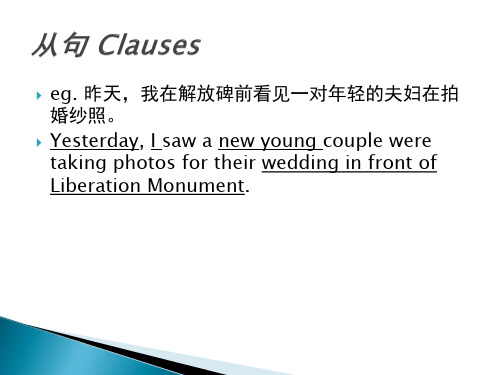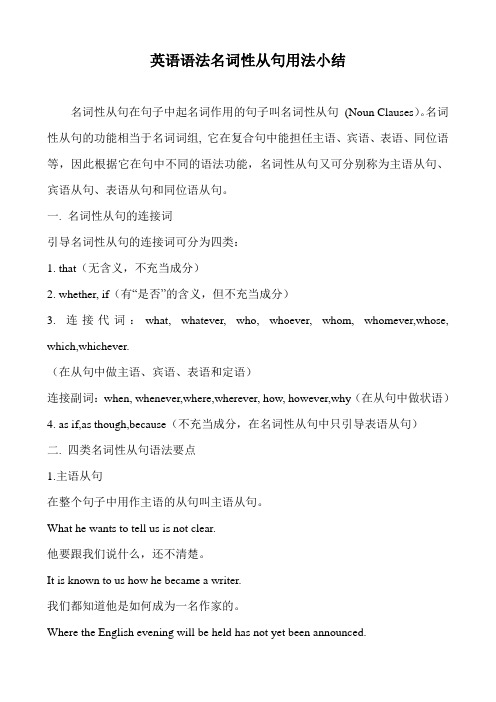名词性从句句子划分
名词性从句

顾名思义,在句子中起名词作用的句子叫名词 性从句(Noun Clauses)。
主语
宾语 表语
主语从句
宾语从句 表语从句 同位语从句
名词从句
名词词组
同位语 介词宾语 。。。。
连接词
引导名词性从句的连接词可以分为三类:
连接词:that, whether, if 连接代词:what, whatever, who, whoever, whom, whomever, whose, which
主语从句
名词化的形容词或过去分词作主语 名词化的介词短语作主语
the poor / the disabled /the sick
From my home to school is three kilometers.
宾语从句
何为宾语? 宾语是动作、行为的对象,是动作的承受者。宾语 由名词、代词、不定式或相当于名词的词、短语来 担任。英语的及物动词后必须有宾语。宾语一般放 及物动词之后,它和及物动词一起说明主语做什么。 说明,除及物动词有宾语之外,英语介词后面也要 有宾语。另外,某些形容词如worth,careful等后 也可有宾语。宾语有直接宾语和间接宾语之分。即 指人的间接宾语和指物的直接宾语,这两个宾语称 为“双宾语”。
eg. 昨天,我在解放碑前看见一对年轻的夫妇在拍 婚纱照。 Yesterday, I saw a new young couple were taking photos for their wedding in front of Liberation Monument.
By Aaron Peng
连接副词:when, where, how, why
名词性从句

语序:陈述语序
在句中充当主语的从句称为主语 从句。英语中主语从句的句型可分 为两大类: 直接将主语从句放在主语位置上; 用it作形式主语,将真正的主语从 句后移,放在其他成分后。
让我们先说说第一类吧!
一、连接词(只起连接作用,在从句中不充当句子成分)
that:无词义。 e.g.: 他赢得比赛一事在我国引起巨大轰动。 That he won the game made a tremendous stir in our country. whether:“是否”。可单独使用,也可与or或or not连用。 e.g.: 我们明天是否能去春游取决于天气。 Whether we can go for a spring outing depends on the weather. 他们是否会来还未告诉我们。 Whether they will come has not been told to us.
四、主语从句与主谓一致
一个从句作主语时,谓语动词通常用单数形式, 特别是用it作形式主语的句型。 e.g.: Whether this kind of chemicals is better has not been tried.
当what引导主从,应遵循意义一致原则,谓语动 词选用相应形式。表语是复数时,谓语动词用复数 形式。 e.g.: What we do willingly is easy. What they were searching for were the missing gems.
Introduction
名词性从句:包括四种:主语从句、表语从句、宾语从
句、同位语从句。
连词:引导名词性从句的连词有以下三类
连接词:只起连接作用,在从句中不充当句子成分; 连接代词:连接主从句,并在从句中作主语/宾语/表 语/定语; 连接副词:连接主从句,并在从句中作时状/地状/原 因状/方式状。
名词性从句总结

名词性从句在句子中起名词作用的句子叫名词从句(Noun Clauses).名词性从句的功能相当于名词词组, 它在复合句中能担任主语、宾语、表语、同位语、介词宾语,形容词宾语等。
因此按照它在句中不同的语法功能,名词性从句又可别离称为主语从句、宾语从句、表语从句和同位语从句。
主要考查语序问题,连接词的选用,时态呼应等。
◆名词性从句的一路点:1)主句和从句之间不能用逗号隔开2)从句部份用陈述句语序◆引导名词性从句的连接词可分为三类:连接词:that, whether ,if 不充当从句的任何成份连接代词:what, whatever( anything that), who, whom,whoever (anyone who), whose, which,whichever连接副词:when, where, how, why一 . 主语从句作句子主语的从句叫主语从句。
主语从句通常由从属连词that,whether,连接代词what,who,which,whatever,whoever和连接副词how,when,where,why等词引导。
that在句中无词义,只起连接作用;连接代词和连接副词在句中既保留自己的疑问含义、又起连接作用,在从句中充当从句的成份。
That she is still alive is a miracle.It doesn’t matter whether they will come or not.It occurred to him that he failed in the examination.What he wants to tell us is not clear.Who will win the match is still unknown.Whichever book you like would be bought for you as a present.Whatever I do is for the good of you.Whoever leaves the room last ought toturn off the lights.When we should close the shop on the holiday has not been decided.Where the meeting will be held has not yet been announced.It is known to us how he became a writer.Why he did so has not been clear.★有时为避免句子头重脚轻,常常利用形式主语it代替主语从句作形式主语,而把主语从句置于句末。
英语语法名词性从句用法小结

英语语法名词性从句用法小结名词性从句在句子中起名词作用的句子叫名词性从句(Noun Clauses)。
名词性从句的功能相当于名词词组, 它在复合句中能担任主语、宾语、表语、同位语等,因此根据它在句中不同的语法功能,名词性从句又可分别称为主语从句、宾语从句、表语从句和同位语从句。
一. 名词性从句的连接词引导名词性从句的连接词可分为四类:1. that(无含义,不充当成分)2. whether, if(有“是否”的含义,但不充当成分)3. 连接代词:what, whatever, who, whoever, whom, whomever,whose, which,whichever.(在从句中做主语、宾语、表语和定语)连接副词:when, whenever,where,wherever, how, however,why(在从句中做状语)4. as if,as though,because(不充当成分,在名词性从句中只引导表语从句)二. 四类名词性从句语法要点1.主语从句在整个句子中用作主语的从句叫主语从句。
What he wants to tell us is not clear.他要跟我们说什么,还不清楚。
It is known to us how he became a writer.我们都知道他是如何成为一名作家的。
Where the English evening will be held has not yet been announced.英语晚会将在哪里举行,还没有宣布。
it 作形式主语:有时为避免句子头重脚轻,常用形式主语it 代替主语从句作形式主语放于句首,而把主语从句置于句末。
It is clear that he is innocent in the accident.很明显,他在这场事故中是无辜的。
2. 宾语从句在整个句子中用作宾语的从句叫宾语从句。
He has told me that he will go to Shanghai tomorrow.他已经告诉我他明天要去上海。
高中英语名词性从句语法讲解

This is how they overcome the difficulties.
My strongest memory is when I attended an
American wedding.
5. 其他连词as if, because, as, as though 引导的表语从句
C.表示某种状态的:remain, keep, prove, continue, stay等.
1. that 引导的表语从句 that 仅起连接作用,无意义,在句中不作任何成分, 通常不可省略。这种从句往往是对主句主语的内容起 进一步解释的作用。
e.g. The chance is that one smoker in four will die from
think等变为否定形式;
e.g. I don’t think you are right.
(5) 在think,believe,imagine,suppose,guess,hope
等动词以及 I’m afraid 等后,可用so代替一个一定的
宾语从句,还可用not代替一个否定的宾语从句:
e.g. 一Do you believe it will clear up你认为天气会转晴吗
连接副词:when, where, how, why 连接代词和连接副词一般做句子的某一成份
The Subject Clause
用作主语的从句叫主语从句。引导主语从句的 连接词有:
连词that, whether;
连接代词what, whatever, who, whoever, whom, whomever, whose, which,
句子成分分析名词性从句形容词性从句和副词性从句的句子结构剖析

句子成分分析名词性从句形容词性从句和副词性从句的句子结构剖析在语法学中,句法分析是对句子结构的研究和解析,包括句子成分和句子成分之间的关系。
本文将对名词性从句、形容词性从句和副词性从句这三种常见的从句进行句子结构剖析,以帮助读者更好地理解和运用这些从句。
1. 名词性从句名词性从句在句子中担任名词的成分,通常用来作主语、宾语、表语或同位语。
它可以由连接词"that"引导,也可以由"wh-"系列引导(如who、whom、whose、which、what等),甚至可以由whether或if引导。
名词性从句的句子结构较为简单,通常是一个完整的句子,与主句之间存在一定的从属关系。
下面是一些例子:- 主语从句:That he is late surprises me.(他迟到了让我吃惊。
)- 宾语从句:I know who did it.(我知道是谁干的。
)- 表语从句:My wish is that he may succeed.(我希望他能成功。
)- 同位语从句:The fact that she passed the exam excited her.(她通过了考试的事实让她很激动。
)2. 形容词性从句形容词性从句用来修饰名词或代词,并且起到形容词的作用。
一般由关系代词(如who、whom、whose、which、that等)引导。
形容词性从句常位于被修饰词后面,起到限定或描述的作用。
下面是一些例子:- The book that is on the table is mine.(在桌子上的那本书是我的。
)- The person who borrowed my phone is my friend.(借了我的手机的人是我的朋友。
)- I like the movie which is based on a true story.(我喜欢那部根据真实故事改编的电影。
名词性从句
你告诉我们的消息真的令人鼓舞。
二、同位语从句与定语从句的不同之处
1、含义不同:同位语从句是对前面名词的解释说明, 知道具体内容,指同一件事(可以划等号);定语从 句用来修饰、限定前面的名词,不知道具体内容。
e.g. The news that our team has won the final match is encouraging. (从句说明“消息”
7.Miss. Liang , a 24-year-old girl, teaches us
English .
(名词作同位语)
8.The news that our team had won made us happy.
(从句作同位语)
4. 在句中用作同位语的从句叫做同位语从句. 其用途是对前面的名词作进一步解释,说明 该名词的具体内容。可以跟同位语从句的名词 通常是news,idea,fact,word,hope,advice等。
It is a pity that you didn't go to see the film yesterday.
It is reported that China has sent another man-made satellite into orbit.
It dose't matter whether he is wrong or not.
(同位语从句)
2. The news that they _w__o__n__ the game s__p__r_e__a__d__
the whole school.
(宾语从句)
3. I _d__o_n__’_t__t_h__i_n__k_ that he i_s_ an honest boy.
定语从句与名词性从句
4.关系词用法: A. 关系代词: 1. who 人, 2. whom 人 3. that 人/ 物 4. which 物, 5. whose + n
主语 / 宾语 (作宾语可省略) 宾语 (作宾语可省略) 主语 / 宾语/表语 (作宾语可省略) 主语 / 宾语 (作宾语可省略) 一起构成从句主语
Last week , I met John ,. who seemed to be very excited. I like the girl who ,. who has has short short hair. hair.
2.先行词 指被定语从句修饰的名词或代词 一般先行词在定语从句的前面 3. 关系词 引导定语从句的词叫关系词。 that, which, who, whom, whose, as 关系代词: when, where, why 关系副词: ①连接主句从句 ② 代替先行词 关系词作用: ③在从句中充当一个句子成分
1.句子基本句型: 1>谓 He came . I bought a book yesterday .
2>主谓宾
3>主谓+间宾+直宾 I gave him a book .
4>主谓+宾语+宾补 We made him monitor .
5>主系表 2. 状语及定语 He is a brilliant student .
3.名词性从句 1>That he has won the prize is true. 主语从句 = It is true that he has won the prize. 2> I know that he has won the prize. 宾语从句
(完整版)名词性从句用法归纳
名词性从句:在句子中起名词作用的句子叫名词性从句(Noun Clauses)。
名词性从句在复合句中能担任:主语、宾语、表语、同位语、介词宾语等。
名词性从句分为:主语从句、宾语从句、表语从句和同位语从句。
一、引导名词性从句的连接词引导名词性从句的连接词可分为三类:1、从属连词(5个):(1)that无词义,在从句中不做成分,在宾语从句或表语从句中that有时可以省略(2)whether,if 有词义,在从句中不做成分(whether,if均表示“是否”之意,表明从句内容的不确定性)不可以省略(3)as if, as though (均表示“好像”,“似乎”之意)在从句中不做成分2、连接代词(9个):what, whatever, who, whoever, whom, whomever, whose, which, whichever,有词义,在从句中做成分,不可以省略(who what which 在从句中做主语、宾语、其中what 指代没有范围的事物,which指代有范围的事物,表“选择哪一个”whom做宾语whose 做定语)3、连接副词(7个):when, where, how, why, whenever, wherever, however有词义,在从句中做状语,不可以省略4、that省略的情况:(1)定语从句中做宾语(2)that引导宾语从句时(3)that引导表语从句时(4)主语从句中it做形式主语,that从句置于句末时5、that不可省略的情况:(1)定语从句中做主语(2)由that引导主语从句放句首时(3)that引导同位语从句时(4)宾语从句中i it做形式宾语,真正的that宾语从句中that不可以省略ii 一个句子有两个或多个并列的宾语从句时,引导第二个和以后几个句子中的that不可以省略iii 与动词相隔的宾语从句,不可以省略iv that引导的宾语从句放在句首时,不可以省略二. 主语从句1、主语从句:作句子主语的从句叫主语从句。
名词性从句和宾语从句的不同
名词性从句和宾语从句的不同名词性从句和宾语从句是英语中两种常见的从句类型,它们在构成和功能上有一些不同之处。
本文将对名词性从句和宾语从句进行比较,以便更好地理解它们的差异。
一. 名词性从句名词性从句是指在句中充当名词的从句。
它可以出现在句子的主语、宾语、表语或补语的位置上,从而在句子中担任相应的成分。
名词性从句可以分为以下四种类型:1. 主语从句主语从句在句子中充当主语,通常由连接词“that”引导,也可以由“whether/if”引导。
例如:- That she is late is not surprising. (她迟到并不奇怪。
)- Whether we can finish the project on time is still uncertain. (我们能否按时完成这个项目还不确定。
)2. 宾语从句宾语从句出现在句子中作为动词的宾语,常常由连接词“that”引导,也可以由一些疑问词引导,如“whether/if, what, who, where, how, when”等。
例如:- He told me that he would come. (他告诉我他会来。
)- I don't know where she lives. (我不知道她住在哪里。
)3. 表语从句表语从句出现在句子中作为系动词的表语,常由连接词“that”引导。
例如:- The important thing is that you understand the concept. (重要的是你理解这个概念。
)4. 同位语从句同位语从句出现在句子中对某个词或短语进行解释或详细说明,通常由连接词“that”引导。
例如:- The fact that he passed the exam surprised everyone. (他通过了考试这个事实让每个人都感到惊讶。
)二. 宾语从句宾语从句是指在句中充当宾语的从句。
- 1、下载文档前请自行甄别文档内容的完整性,平台不提供额外的编辑、内容补充、找答案等附加服务。
- 2、"仅部分预览"的文档,不可在线预览部分如存在完整性等问题,可反馈申请退款(可完整预览的文档不适用该条件!)。
- 3、如文档侵犯您的权益,请联系客服反馈,我们会尽快为您处理(人工客服工作时间:9:00-18:30)。
第 1 页 共 7 页 英语符合句成分划分 一、名词性从句 That we shall be late is certain. That the driver could not control his car was obvious. It is certain that we shall be late. It was obvious that the driver could not control his car. It is clear that he was telling the truth. It’s probable that we’ll be a little late. It’s a pity that you can’t go with us. It worried her a bit that her hair was turning grey. It shocked me that Peter didn’t tell anybody where he was. It is said that he has been there many times It seems that he has lost something. What he said at the meeting encouraged everyone. Whoever fails to see this will make a big blunder. What he wants to buy is a ten-speed bicycle. Whoever breaks the law is sure to be punished. What caused the accident is a complete mystery. What caused the accident was a broken bottle. What she looks like doesn’t matter. What she’d like is a digital watch. He said (that) he wanted to stay at home. She doesn’t know (that) she is seriously ill. I am sure (that) he will succeed. He asked whose handwriting was the best. Can you tell me where the No.3 bus stop is? I don’t know why the train is late. I want to know if (whether) he lives there. He asked me whether (if) I could help him. I think (that) you will like this school soon. 第 2 页 共 7 页
Can you tell me how I can get to zoo? Please tell me when we’ll have the meeting. The problem is when we can get a pay rise. He has become a teacher. He has become what he wanted to be ten years ago. She has remained there for an hour. She has remained where I stood yesterday for an hour. His suggestion is that we should stay calm. The question is when he can arrive at the hotel. how I can persuade her to join us in the party. whether the enemy is marching towards us. The question is when he can arrive at the hotel. The question is whether the enemy is marching towards us. It looked as if he had understood this question. The news that they had won the game soon spread over the whole school. The general gave the order that the soldiers should cross the river at once. We'll discuss the problem whether the sports meeting will be held on time. I have no idea when he will be back. I have no impression how he went home, perhaps by bike. The thought came to him that maybe the enemy had fled the city. 二、状语从句 时间状语 I didn’t realize how special my mother was until I became an adult. While John was watching TV, his wife was cooking. The children ran away from the orchard(果园), the moment they saw the guard. No sooner had I arrived home ,then it began to rain. Every time I listen to your advice, I get into trouble. 2. 地点状语从句 Generally, air will be heavily polluted where there are factories. 第 3 页 共 7 页
Wherever you go, you should work hard. Where there is no rain, farming is difficult or impossible. They were good persons. Where they went, there they were warmly welcomed. You should have put the book where you found it. Where the Communist Party of China goes, there the people are liberated. Wherever the sea is , you will find seamen.有海就有海员。 3. 原因状语从句 My friends dislike me because I’m handsome and successful. Now that everybody has come, let’s begin our conference. The higher income tax is harmful in that it may discourage people from trying to earn more. 4. 目的状语从句 The boss asked the secretary to hurry up with the letters so that he could sign them. The teacher raised his voice on purpose that the students in the back could hear more clearly. 5. 结果状语从句 He got up so early that he caught the first bus. It’s such a good chance that we must not miss it. To such a degree was he excited that he couldn’t sleep last night. 6. 条件状语从句 We’ll start our project if the president agrees. You will certainly succeed so long as you keep on trying. Provided that there is no opposition, we shall hold the meeting here. 7. 让步状语从句 Much as I respect him, I can’t agree to his proposal. The old man always enjoys swimming even though the weather is rough. No matter how hard he tried, she could not change her mind. 第 4 页 共 7 页
He won’t listen whatever you may say. 8. 比较状语从句 She is as bad-tempered as her mother. The house is three times as big as ours. The more you exercise, the healthier you will be. Food is to men what oil is to machine. 食物之于人,犹如油之于机器。 9. 方式状语从句 When in Rome, do as the Roman do. She behaved as if she were the boss. Sometimes we teach our children the way our parents have taught us. 10. 状语从句的简化 When ( the museum is ) completed , the museum will be open to the public next year . He’ll go to the seaside for his holiday if (it is ) possible. I’m taller than he (is tall ). The higher the temperature (is), the greater the pressure (is ). If (it is) possible, he will help you out of the difficulty. You must attend the meeting unless (it is) inconvenient to you. 定语从句 1. Do you know the gentleman that/who spoke just now? 2. You can take anything ( that) you like. 3. What is the question (that/which) they are talking about? 4. Here is the man ( who/whom/that ) you want to see. 5. She's no longer the girl ( that) she used to be before. 1. The book which/that was on the desk was bought by my father. 2. The book (which/that) I bought yesterday is very interesting. 3. The factory in which his father works is far from here. 1. I like the students who/that work hard. 2. All who heard the story were amazed. (代词如he, they, any, those, all, one等后多用who.)
